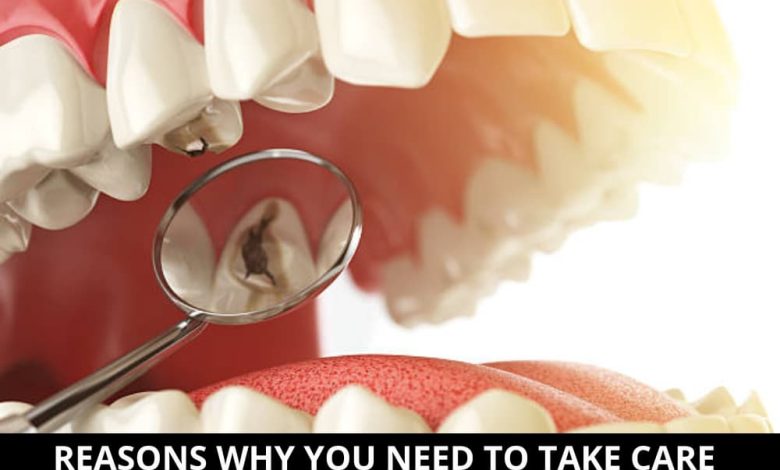Reasons Why You Need to Take Care of Your Oral Cavities

Oral Cavities are little holes or gaps on the hard surface of your teeth that are damaged permanently. Cavities can result from many things, including oral bacteria, frequent eating, consuming sugary beverages, and inadequate tooth cleaning.
Among the most prevalent health issues worldwide are cavities and tooth decay. Children, teens, and elderly individuals are particularly susceptible to them. However, cavities may affect everyone who has teeth, including young children.
If left untreated, cavities get bigger and harm your teeth’s deeper layers. They may result in tooth loss, an infection, and excruciating dental pain.
Your best defence against cavities and tooth decay is regular dental appointments and proper brushing and flossing practices.
Symptoms of Tooth Decay
The indications and symptoms of toot decay can vary, depending on their degree and location. When a cavity is only developing, you may not have any symptoms. As the degradation becomes greater, it may create signs and symptoms such as:
- Toothache, spontaneous pain or pain that happens without any obvious reason.
- Sensitive teeth.
- There may be mild to severe discomfort when consuming sweet, spicy, or cold foods or beverages.
- Your teeth have any obvious divots or pits.
- Any surface of a tooth with brown, black, or white stains.
- When you bite down, it hurts.
What Could Be the Causes of Your Cavities?
Tooth decay, a gradual process, is what leads to cavities. Here is how dental degeneration progresses;
Plaque forms
Your teeth are covered in a transparent, corrosive layer called dental plaque. It results from consuming a lot of carbohydrates and neglecting to brush your teeth properly.
Plaque forms on your teeth very fast when sugars and starches aren’t removed by brushing or flossing. Tartar is created when plaque that remains on your teeth hardens under or above your gum line (calculus). Tartar acts as a barrier for germs and makes plaque removal more challenging.
Plaque attack
The acids remove the minerals in your tooth’s hard, outer enamel in plaque. Cavities begin due to this erosion, which creates microscopic gaps or holes in the enamel.
The germs and acid can reach the dentin, the next layer of your teeth if portions of the enamel have been worn away. Compared to enamel, this layer is softer and less acid-resistant. Sensitivity is brought on by small tubes in the dentin that connects directly to the tooth’s nerve.
Damage persists.
The bacteria and acid that cause tooth decay keep migrating through the inner tooth substance (pulp), which is the centre house of nerves and blood vessels as tooth decay progresses.
The germs cause the pulp to swell and itch. The nerve becomes compressed and causes pain since there is nowhere for the swelling to develop inside a tooth. Even the bone outside the tooth root may experience discomfort.
Reasons Why You Need to Take Care of Your Tooth Cavities.
Gum disease.
Th first thing to take care of in the Oral Cavities is the gum disease. As you age, your gums gradually recede, leaving tooth surfaces and roots vulnerable to microorganisms that can lead to decay.
Regular dental checkups, teeth cleanings, regular brushing, flossing, and the use of a fluoride mouthwash will all assist in preventing decay. To get rid of plaque that may form behind your gums, you can receive teeth cleaning services in Calgary.
Dry mouth.
Age and some drugs can reduce saliva production, resulting in a dry mouth. Saliva helps keep your mouth moist and naturally cleans the surfaces of your teeth to get rid of food particles that might cause decay.
Drink water throughout the day, chew sugar-free gum and steer clear of mouthwash that includes alcohol because it might dry down oral tissues to keep it flowing.
Brittle teeth.
Enamel on teeth can weaken and shatter as we age. Avoid biting into hard objects like popcorn hulls, ice chips, and crusty bread to protect your teeth. Instead, choose items that are simple to chew. Contact your dentist if you develop pain when consuming food or liquids.
Plaque.
When using a toothbrush or flossing your teeth, arthritis and other medical disorders might affect your fingers and make them difficult to use. If you suffer from this issue, speak with your dentist about utilising floss picks or water flossers to reduce plaque.
Sensitive teeth.
Regular toothpaste, meals, and beverages may cause your teeth to grow more sensitive over time. Dental professionals advise mouthwash and toothpaste designed for sensitive teeth. Schedule routine dental exams to ensure tooth sensitivity is not caused by decay or other oral issues.
Implants and bridges.
Tooth decay can be brought on by food particles and germs that become stuck in implants and bridges. To clean below and around these devices, use floss threaders.
Inquire with your dentist about using a water flosser or other device to eliminate plaque and food debris. Artificial teeth may not be a concern if you take care of your teeth today. Also, you can know about major causes of stomach pain.
Tips to Take Care of Your Oral Cavities.
Brush your teeth regularly.
The first thing that every dentist advises is brushing your teeth. However, how you brush and hold your toothbrush is also crucial.
You must keep the brush with care at a 45-degree angle above the gum line so that the bristles make contact with both the tooth surface and the gum line. Make sure to brush your teeth for at least 2 minutes to cover most of each tooth’s surface.
Flossing.
You might find flossing a boring task but keep in mind that even after brushing, at least 40% of the surface of your teeth is still not in affect. Food residue and other dangerous items that normal brushing cannot remove can sometimes be eliminated with flossing.
Have a healthy diet.
Calcium is essential for healthy teeth. You must eat wholesome foods like milk, yogurt, cheese, orange juice, and other calcium- and vitamin-rich meals.
Conclusion.
Cavities can be avoided with regular dental exams and adequate oral hygiene. Children and teenagers are less likely to get cavities because of new dental procedures like fluoride rinses and tooth sealants.
Old dental fillings from childhood may cause cavities to form around the margins in adults. In older people, exposed roots from receding gums may potentially develop cavities. Consult your dentist for advice on safeguarding your dental health and avoiding cavities.





